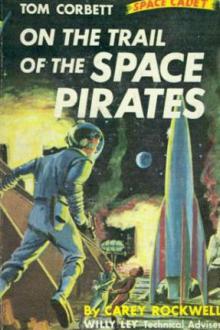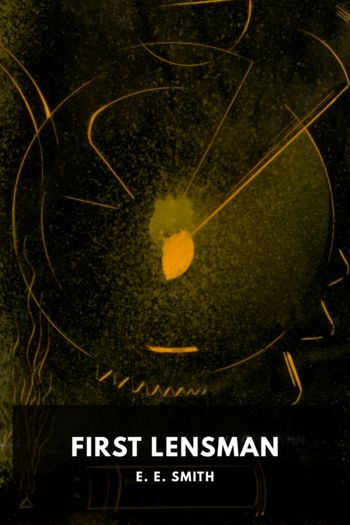Triplanetary - E. E. Smith (phonics reader TXT) 📗

- Author: E. E. Smith
Book online «Triplanetary - E. E. Smith (phonics reader TXT) 📗». Author E. E. Smith
“Jupiter, ward from me Ahenobarbus’ evil eye!” he called aloud, and turned.
“Where are you going?” Petronius, still shaking, demanded.
“To do the job you swore to do, of course—to kill that bloated toad. And then to give Tigellinus what I have owed him so long.”
At full run, he soon overtook his fellows, and waded resistlessly into the fray. He was Grand Champion Patroclus, working at his trade; the hard-learned trade which he knew so well. No Praetorian or ordinary soldier could stand before him save momentarily. He did not have all of his Thracian armor, but he had enough. Man after man faced him, and man after man died.
And Nero, sitting at ease with a beautiful boy at his right and a beautiful harlot at his left, gazed appreciatively through his emerald lens at the flaming torches; the while, with a very small fraction of his Eddorian mind, he mused upon the matter of Patroclus and Tigellinus.
Should he let the Thracian kill the Commander of his Guard? Or not? It didn’t really matter, one way or the other. In fact, nothing about this whole foul planet—this ultramicroscopic, if offensive, speck of cosmic dust in the Eddorian Scheme of Things—really mattered at all. It would be mildly amusing to watch the gladiator consummate his vengeance by carving the Roman to bits. But, on the other hand, there was such a thing as pride of workmanship. Viewed in that light, the Thracian could not kill Tigellinus, because that bit of corruption had a few more jobs to do. He must descend lower and lower into unspeakable depravity, finally to cut his own throat with a razor. Although Patroclus would not know it—it was better technique not to let him know it—the Thracian’s proposed vengeance would have been futility itself compared with that which the luckless Roman was to wreak on himself.
Wherefore a shrewdly-placed blow knocked the helmet from Patroclus’ head and a mace crashed down, spattering his brains abroad.
Thus ended the last significant attempt to save the civilization of Rome; in a fiasco so complete that even such meticulous historians as Tacitus and Suetonius mention it merely as a minor disturbance of Nero’s garden party.
The planet Tellus circled its sun some twenty hundred times. Sixty-odd generations of men were born and died, but that was not enough. The Arisian program of genetics required more. Therefore the Elders, after due deliberation, agreed that that Civilization, too, must be allowed to fall. And Gharlane of Eddore, recalled to duty from the middle of a much-too-short vacation, found things in very bad shape indeed and went busily to work setting them to rights. He had slain one fellow-member of the Innermost Circle, but there might very well have been more than one Master involved.
Book II The World War IV 1918Sobbing furiously, Captain Ralph Kinnison wrenched at his stick—with half of his control surfaces shot away the crate was hellishly logy. He could step out, of course, the while saluting the victorious Jerries, but he wasn’t on fire—yet—and hadn’t been hit—yet. He ducked and flinched sidewise as another burst of bullets stitched another seam along his riddled fuselage and whanged against his dead engine. Afire? Not yet—good! Maybe he could land the heap, after all!
Slowly—oh, so sluggishly—the Spad began to level off, toward the edge of the wheatfield and that friendly, inviting ditch. If the krauts didn’t get him with their next pass. …
He heard a chattering beneath him—Brownings, by God!—and the expected burst did not come. He knew that he had been just about over the front when they conked his engine; it was a tossup whether he would come down in enemy territory or not. But now, for the first time in ages, it seemed, there were machine-guns going that were not aimed at him!
His landing-gear swished against stubble and he fought with all his strength of body and of will to keep the Spad’s tail down. He almost succeeded; his speed was almost spent when he began to nose over. He leaped, then, and as he struck ground he curled up and rolled—he had been a motorcycle racer for years—feeling as he did so a wash of heat: a tracer had found his gas-tank at last! Bullets were thudding into the ground; one shrieked past his head as, stooping over, folded into the smallest possible target, he galloped awkwardly toward the ditch.
The Brownings still yammered, filling the sky with cupro-nickeled lead; and while Kinnison was flinging himself full length into the protecting water and mud, he heard a tremendous crash. One of those Huns had been too intent on murder; had stayed a few seconds too long; had come a few meters too close.
The clamor of the guns stopped abruptly.
“We got one! We got one!” a yell of exultation.
“Stay down! Keep low, you boneheads!” roared a voice of authority, quite evidently a sergeant’s. “Wanna get your blocks shot off? Take down them guns; we gotta get the hell out of here. Hey, you flyer! Are you OK, or wounded, or maybe dead?”
Kinnison spat out mud until he could talk. “OK!” he shouted, and started to lift an eye above the low bank. He stopped, however, as whistling metal, sheeting in from the north, told him that such action would be decidedly unsafe. “But I ain’t leaving this ditch right now—sounds mighty hot out there!”
“You said it, brother. It’s hotter than the hinges of hell, from behind that ridge over there. But ooze down that ditch a piece, around the first bend. It’s pretty well in the clear there, and besides, you’ll find a ledge of rocks running straight across the flat. Cross over there and climb the hill—join us by that dead snag up there. We got to get out of here. That sausage over there must have seen this shindig and they’ll blow this whole damn area off the map. Snap it up! And you, you goldbricks, get the lead out of your





Comments (0)